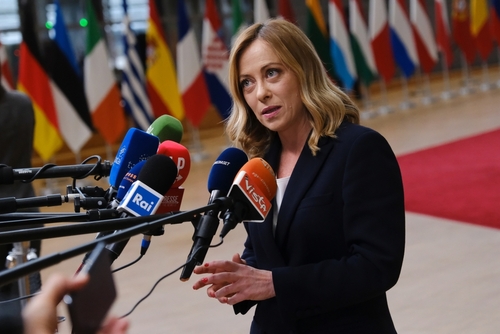
The recent trip to Tripoli by Prime Minister Giorgia Meloni represents an important step forward in relations between Italy and Libya.
The visit, which saw participation in the Italy-Libya Business Forum, was an opportunity to reaffirm the strategic importance that Libya has for Italy and for Europe, as stated by Meloni herself: “We consider the relationship with Libya a priority for Italy and a priority for Europe”. This relationship has materialized in numerous strategic agreements that concern key sectors such as energy, infrastructure, healthcare and agriculture. But beyond the economic aspects, the meeting also opened a new chapter in the collaboration between the two countries for the management of migratory flows, a theme that remains central to Italian international politics.
Resumption of air connections between Italy and Libya
One of the most significant announcements concerns the resumption of air connections between Italy and Libya starting from January 2025, operated by Ita Airways. This is a decision of great importance as it represents a symbolic and practical opening in bilateral relations, promoting trade, tourism and the meeting of peoples. Meloni underlined how Italy was the first Western nation to remove the negative opinion on business travel to Libya, a gesture of trust that demonstrates Italy’s commitment to strengthening ties with the North African nation and contributing to its stability. The resumption of flights, accompanied by a cooperation protocol between ENAC and the Libyan counterpart for the improvement of civil aviation standards, represents a first concrete step towards economic and infrastructural integration between the two nations.
The meaning of economic and industrial cooperation
The Business Forum saw the signing of numerous bilateral agreements, with the aim of consolidating a strategic partnership between Italy and Libya in the sectors of energy, infrastructure, health and agriculture. Libya, for Italy, is a primary economic partner, especially in the energy sector. As underlined by President Meloni, Italy is today Libya’s main importer and the first investor in the Libyan energy sector. Libya’s energy resources are not only of crucial importance for Italy, but also a vital source of energy supply for the whole of Europe. The event also confirmed the involvement of the Italian company Todini in the construction of two lots of the Coastal Highway, a project that is a symbol of Libya’s reconstruction and aimed at improving connectivity within the country. This investment in strategic infrastructure not only facilitates internal connections but also lays the foundation for further strengthening trade relations between the two nations.
Immigration and development: Italy’s policy for managing migration flows
Another key topic addressed during the forum was that of managing migration flows. Meloni reiterated the need to combat irregular immigration and promote legal migration channels instead. To this end, the Italian government recently passed a three-year flow decree that provides for 450,000 legal entries into Italy, a measure that aims to regulate the influx of migrants in a safer and more manageable way.
Cooperation between Italy and Libya is also strategic to jointly address the problems of illegal immigration, fighting human traffickers and trying to create the conditions for stable economic growth in Libya. The Trans-Mediterranean Migration Forum, organized in July in Tripoli, was an important initiative to start a joint dialogue between Italy, the European Union and African countries on the regulation of migratory flows. This approach, as underlined by the Prime Minister, reflects a broad vision that considers the development and security of African nations closely linked to those of Europe.
The vision of Italy as a “bridge” between Europe, Africa and the Middle East
The Italian government, as Meloni stated, considers Italy a natural “bridge” between Europe, the Mediterranean, Africa and the Middle East. This geographical position favors Italy as a strategic hub for energy flows and as a distribution platform between these continents. The vision is ambitious and fits into the broader context of the Mattei Plan for Africa, a proposal for economic development for the African continent that aims to create stronger and more beneficial ties between the countries of the area and Europe. In this context, Libya represents a gateway to African and Middle Eastern markets, with Italy aiming to become an energy hub and a connection point for infrastructure. This vision of an Italy as a protagonist in energy exchange and distribution aims to consolidate the country’s position as a pivot in the wider Mediterranean, promoting the stability and prosperity of neighbouring nations and, ultimately, Europe.
Future prospects for Italy-Libya cooperation
The Italy-Libya Business Forum has laid the foundations for a new phase of economic and commercial cooperation between the two countries. According to the statements of Libyan Minister Adel Gomaa, the current volume of bilateral trade, which amounts to around 9 billion euros per year, constitutes a solid basis on which to build, but there is still ample room for growth. With the increase in bilateral transactions and greater collaboration in key sectors, Italy and Libya can aspire to a strengthening of their economic partnership, which could represent a virtuous example of cooperation between a European nation and a North African country.
The visit of Prime Minister Giorgia Meloni to Tripoli marked a new beginning in relations between Italy and Libya, with the signing of agreements that cover sectors of primary importance. The cooperation between the two countries goes far beyond trade, touching on issues of security, development and regional stability. Italy, with its strategic position, can assume a leadership role in the Mediterranean, acting as a bridge between Europe, Africa and the Middle East. If these relations continue to develop positively, Italy will have the opportunity to strengthen its influence in the region and contribute to building a safer, more prosperous and integrated Mediterranean.



 Subscribe
Subscribe